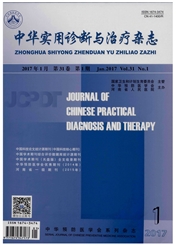

 中文摘要:
中文摘要:
目的:探讨华支睾吸虫成虫可溶性抗原和排泄-分泌物抗原ELISA检测的临床诊断价值。方法:分别以虫体可溶性抗原和排泄-分泌物抗原作为诊断抗原,采用间接ELISA检测方法检测感染者(来自流行区,粪便虫卵检测阳性)血清107份和健康人(来自非流行区,粪便虫卵检测阴性)血清50份,计算其敏感性、特异性和符合率,并进行两种诊断抗原间的统计学比较与评价。结果:可溶性抗原的敏感性为58.88%,特异性为98%,符合率为71.34%;排泄-分泌物抗原的敏感性为87.85%,特异性为100%,符合率为91.72%。经统计学分析,两者敏感性和符合率差异具有统计学意义(P〈0.05)。特异性差异无统计学意义(P〉0.05)。结论:作为诊断抗原,排泄-分泌物抗原优于可溶性抗原。排泄-分泌物抗原具有较高的敏感性与特异性,对于华支睾吸虫感染具有较高的诊断价值。
 英文摘要:
英文摘要:
Objective To analyze the sensitivity and specificity of excretory-secretory antigen and crude antigen as diagnostic antigens for the serodiagnosis of clonorchiasis by ELISA. Methods Excretory-secretory antigen and crude antigen of C. Sinensis adult larvae was used to detect 107 positive sera and 50 negative sera of clonorchiasis patients by ELISA, in which, all of the sera were confirmed by egg examination of dejecta. The sensitivity and specificity of two antigens were compared and evaluated. Results The sensitivities of excretory-secretory antigen and crude antigen were 87.85% and 58. 88%, respectively(P〈0. 05). The specifities of two antigens were 100% and 98%, respectively (P〉0.05). Coincidence from two antigens was 91.72% and 71.34%, respectively (P〈0.05). Conclusion Either sensitivity or specificity of excretory-secretory antigen is better than that of crude antigen for the serodiagnosis of clonorchisis by ELISA.
 同期刊论文项目
同期刊论文项目
 同项目期刊论文
同项目期刊论文
 期刊信息
期刊信息
